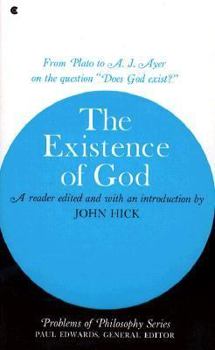The Existence of God
Select Format
Select Condition 
Book Overview
The principal philosophical arguments on the existence of God are brought together here. From the ancient Greeks and Anselm to the present day and Bertrand Russell... This description may be from another edition of this product.
Format:Paperback
Language:English
ISBN:0020854501
ISBN13:9780020854500
Release Date:January 1964
Publisher:MacMillan Publishing Company
Length:320 Pages
Weight:0.46 lbs.
Dimensions:0.8" x 4.2" x 7.0"
Customer Reviews
3 ratings
An outstanding anthology!
Published by Thriftbooks.com User , 15 years ago
I have owned this little volume for over 40 years, and I keep coming back to it as the most useful anthology available of arguments for and against the existence of god. Each section is devoted to a particular type of argument (ontological, cosmological, design, etc.) and contains selections from a proponent and an opponent of the argument. For example, the section on the ontological argument has the statement of the argument from Anselm, Descartes, and Leibniz, with the refutation by Kant. The chapter on the design (teleological) argument includes Paley's watchmaker analogy, and Hume's refutation. In addition to the classical arguments, there are chapters dealing with modern critiques based on psychology (e.g, Feuerbach) and logical/linguistic analysis (e.g., Ayer and Flew). Also, the 19-page introduction by Hick is a very succinct and clearly written assessment of the merits of the various arguments. As a handy reference to theistic and anti-theistic thought, The Existence of God is as good as you're going to find.
Interesting summary of monotheistic arguments
Published by Thriftbooks.com User , 19 years ago
As a Pagan, I have to admit that there are quite a few scholars in the field of Divinity, including the editor of this book, John Hick. And by Divinity, I mean study of the monotheistic god. I have very little respect for that god. Let's see how the 23 authors in this book fare when dealing with this topic. The first argument for the existence of the monotheist god is the ontological one, by Saint Anselm. Anselm argued that perfection entails existence. Since the monotheistic god is perfect, it exists. But Saint Thomas Aquinas rejects this argument. Descartes and Liebniz restate and expand on Anselm's argument, but then Kant argues that existence is not really a predicate. And Norman Malcolm provides further discussion. I think the whole argument is silly given that no being can be perfect, and that even if a being could be perfect in some respect, no such being might exist. But I do think it applies far better to the real Goddesses and Gods than to the monotheist god. We then get to the "first cause" argument. Plato, Aquinas, and Copelston explain the basis for this argument. But David Hume argues that there is no contradiction in omitting a "first cause." I think that a complex first cause simply violates Occam's Razor. Whatever the Gods and Goddesses may be, they are not first causes. Perhaps existence can come from nothing, but there is no reason to assume that it starts with impossibly infinite complexity. After that we have the argument from Design. A watch needs a watchmaker. Paley states this argument, unaware of Hume's strong criticism of it from 23 years earlier. I think this argument does suffer from one of the same problems as the First Cause Argument, namely "who made god?" We then get to the problem of evil (which appears to make hash out of the hypothesis that there is an omnipotent and benevolent god). And arguments from morality, and from religious experience. There's an interesting debate between Copelston and Bertrand Russell. After this, there is an article that discusses the validity of biblical arguments, and another about whether theistic proofs make sense even from a religious point of view. We then get to a powerful argument, namely falsification. This is stated powerfully by A. J. Ayer and Anthony Flew. Namely, what would have to happen (or have to have happened) to convince one that god does not love us or does not exist? The answer to that question helps define what one means when one discusses god (if in fact there is any cognitive meaning at all). Braithwaite concedes this argument, but explains that religious statements have ethical significance, while John Hick asserts that the claim of god's existence is of a factual nature. I recommend this book to those interested in the subject.
Provocation of thought to the highest degree
Published by Thriftbooks.com User , 25 years ago
Yearn to obtain book again. Most thought provoking read in 5 years of college. Philosophy course at St. Louis University was required reading. The synopses of great thinkers are direct and to the point. The reader gets much for the money.





